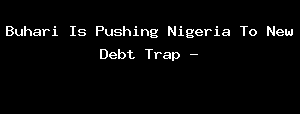Communications And EntertainmentNews And PoliticsMotivationalsBusiness And MoneyReligion And PrinciplesArts And EducationRelationship And MarriageSports And FitnessLawHealth And LifestyleHobbies And HandiworksPoliticsSocial SciencesEngineeringScience And TechnologyPersonal Care And BeautyFamily And HolidaysStories And PoemsAgricultureCelebrityIT And Computer ScienceGive AidVehicles And MobilityFood And KitchenAnnouncement
profile/9761IMG_20200218_221142_875.jpg
RachaelB

Buhari Is Pushing Nigeria To New Debt Trap -
~3.1 mins read
RENEWED alarm raised by some stakeholders over the country’s headlong plunge into debt demonstrates the precarious state of the economy and the need for an effective remedial strategy. While the Governor of Kaduna State, Nasir el-Rufai, private sector operators and federal legislators separately lamented that Nigeria was close to borrowing beyond its capacity to repay, the Federal Government was ramping up fresh borrowing plans. There should be a limit to borrowing: promoting productive and long-term investment offers a better option for reviving the economy.The debt conundrum is unnerving. El-Rufai and others gathered at the annual conference of the Chartered Institute of Taxation of Nigeria warned that the country had neared its maximum borrowing capacity. At 18 per cent, compared to a tax-to-GDP of 6.1 per cent, debt-to-GDP ratio is nearing a dangerous level, they warned. Meanwhile, revenue-to-debt, the real marker the International Monetary Fund has told policymakers to watch, reached 99 per cent in the first quarter of this year. News also broke of pushback from some members of the usually pliant House of Representatives to the government’s plan to obtain a new $1.2 billion from Brazil.Ominously, the Minister of Finance, Budget and National Planning, Zainab Ahmed, said the government would borrow a total of N6.17 trillion in 2021, higher than the initially projected N5.2 trillion deficit (at 3.64 per cent of GDP, it is above the prescribed 3.0 per cent threshold), billed to be funded by debt and privatisation proceeds. Realising the revenue target of N7.88 trillion is shakier, following the destruction wrought by recent riots and the continued ravages of the resurgent COVID-19 pandemic.No country can escape debt entirely. For emerging economies especially, development agencies recommend a judicious mix of well-structured credit, aid, foreign direct investment, tax revenues, PPP and domestic capital formation to drive development and the transition to middle income and high-income status. UNCTAD said that due to the increasing fragilities of the financial and economic environment since the 2008 global meltdown, developing economies’ debt rose from under 40 per cent of global GDP to 93.2 per cent in 2017 with external debt stock rising by 8.5 per cent annually. With the pandemic and depressed commodity prices, the World Economic Forum reports record level borrowing by both rich and poor countries, saying if well applied, debt can help recovery and cushion the impact. Up to $3.5 billion has already been pledged to Nigeria by the World Bank/IMF pair.Borrowing perpetually for all projects, however, is unrealistic and unsustainable. The wiser course of action is for the government to target higher revenues by improving tax administration and by massive privatisations; rather than borrowing for all rail, airport and ports projects, it should liberalise and grant concessions. Liberalisation magnetised over $70 billion investment in the ICT sector between 2001 and October 2020, adding 15.09 per cent to GDP by Q2 2020, from 4.1 per cent in 2004.The regime of the President, Major General Muhammadu (retd.), has been particularly reckless, shattering all previous borrowing records. The Debt Management Office figures show that total public debt stock – federal, states; domestic and external – was N12.35 trillion in September 2015, rose to N16.88 trillion a year later, N20.37 trillion in September 2017, N26.21 trillion by September 2019 and N31 trillion this year. Ahmed projects it to reach N38.6 trillion by December 2021. External debt in September 2015, four months after Buhari assumed office, was just $10.61 billion, but has been growing exponentially; to $15.35 billion in 2017, $26.94 billion in 2019 and $31.47 billion by June 30, 2020. Worse is that beyond claiming to pay public employees’ salaries, Nigerians see little to justify the debt amassed on their behalf.In contrast, under Public-Private Partnership arrangements, Ethiopia and Djibouti jointly built the 756-kilometre Addis Ababa-Djibouti Rail at a cost of $4.5 billion that provided land-locked Ethiopia access to the sea and carries 95 per cent of its trade. According to the World Bank, Morocco was able to develop first rate infrastructure, including the port of Casablanca, one of the world’s largest artificial ports and 70 airports, 11 of which are globally rated, by utilising aid, loans, improving its tax system, attracting FDI and facilitating domestic entrepreneurship.
profile/9761IMG_20200218_221142_875.jpg
RachaelB

Diego Maradona Buried As Argentina Grieves (Photos)
~1.6 mins read
Football legend Diego Maradona has been buried in a private ceremony after a day of emotional scenes in the Argentine capital Buenos Aires.Only around two dozen relatives and close friends attended the final ceremony on Thursday.

But earlier huge crowds turned out to pay their respects, with many weeping, blowing kisses and praying as they filed past his coffin.
Maradona died of a heart attack on Wednesday aged 60.His death triggered mourning around the world but nowhere was it felt more fiercely than in a country that saw him as a national hero.Maradona's coffin - draped in Argentina's national flag and football shirt, bearing his trademark number 10 on the back - was on public display at the presidential palace on Thursday.




Advertisement

Link socials
Matches
Loading...
